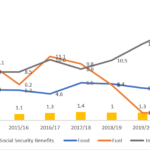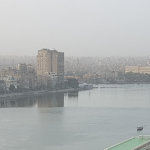Energy costs are on the rise in Egypt and shortages of electricity have resulted in scheduled power outages since August 2023. Understanding the trade-offs inherent in the energy subsidy system can help policymakers to chart the best course in a difficult economic period.
Are fuel or food subsidies the right policy tools to reduce inequality? An evidence-based illustration for four Arab economies
Paul Makdissi, Professor of Economics, University of Ottawa, Canada
Countries of the MENA rely mostly on consumption subsidies for reducing inequality. As we will illustrate below, a move from fuel subsidies towards food subsidies would be desirable. Unfortunately, some countries also started eliminating food subsidies.
Publication: Phasing out energy subsidies as part of Egypt’s economic reform program: Impacts and policy implications
Clemens Breisinger, Askar Mukashov, Mariam Raouf, and Manfred Wiebelt
In order to address long-standing economic challenges, in 2016 the Government of Egypt (GOE) put in place a major economic reform program to restore macroeconomic stability and to promote inclusive growth. As a result, there are early signs that the economy is rebounding and Egypt’s economic outlook is becoming more favorable. However, it is less clear how the ongoing reform program is affecting households, especially the poor. To shed light on this question, this paper uses an economy-wide model to estimate the distributional impacts of the energy subsidy cuts in 2014, 2016, and 2017, the currency devaluation at the end of 2016, and the expected complete phasing out of energy subsidies over the coming years.
The Tamween Food Subsidy System in Egypt
January 29, 2018 By: Sherine Al-Shawarby, Vice Dean, Faculty of Economics and Political Science, Cairo University Over the many upheavals and spells of stability, Egypt’s policy makers have persistently prioritized food subsidies in an effort to achieve social equity and political stability. The recently published World Bank book The 1.5 billion People Question: Food, Vouchers, or Cash? includes […]
Wheat imports subsidy in the Sudan: a waste of state funds, an oligopoly or a food security mechanism?
June 23, 2016 By: Khalid Siddig; Senior Researcher: International Agricultural Trade and Development, Humboldt University of Berlin, Germany. Associate Professor: Department of Agricultural Economics, Khartoum University, the Sudan. Share URL Wheat, a major staple cereal crop in the Sudan is targeted by numerous government policies. The most unpopular policy was the self-sufficiency policy that replaced cotton […]



